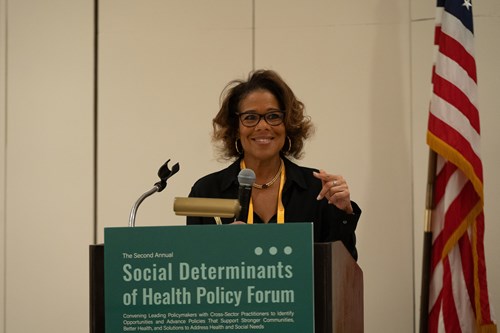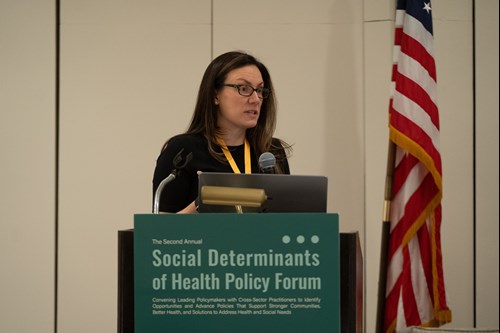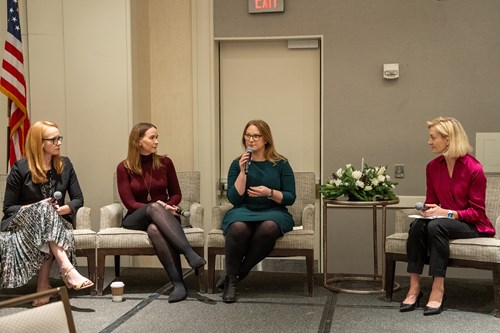The second day of the Social Determinants of Health (SDoH) Policy Forum featured direct feedback from patients impacted by SDoH, an update from Congressional SDoH champions, and more. Here is a recap of two of the sessions.

Co-Chair Sandra Elizabeth Ford, M.D., M.B.A., F.A.A.P., public health expert, CEO, BFT Consulting, LLC, former special assistant to the President for public health and science, White House Domestic Policy Council, officially kicked off the second day of the conference with welcome remarks and an eagerness to hear directly from individuals experiencing SDoH. “We saw yesterday that this is not just a one-off,” she said. “This is a really, really big issue, so this is a powerful panel.”
Insights from patients impacted by SDoH
We heard gripping direct feedback from a panel of community members affected by SDoH, who shared their experience, access to care, and ways to improve policy efforts.

Adrienne Tenney, director of operations, Engagys, moderated the panel of six individuals, all from the D.C. area, with a wide range of lived experiences as patients, caregivers, parents, veterans, and community volunteers.
The eye-opening discussion revealed several key barriers: access to care, cultural competency and empathy, and health literacy.
Panelists shared stories of waiting in the ER for 20+ hours just to be put on a gurney in the hallway for an additional 20+ hours without any care; waiting for a foodbank truck for four hours just to find out it wasn’t coming; being unable to find a doctor who will take Medicaid for their 29-year-old son who has Down syndrome; and nearest grocery stores that are extremely unsafe to visit.
All of the panelists agreed: contacting insurance plans, researching doctors in their areas who take their coverage, and navigating all the different patient portals is a full-time job. “I’m on limited income,” said one panelist, who is frequently navigating the health care system for her young son with autism. “It takes the time of a full-time job to call these doctors, look at their backgrounds, and try to find one you’re comfortable with.”
When asked who was aware of programs within their community that would help address these challenges, only one panelist was familiar with some, and it was due to his involvement working with his local senior center.
Updates from Congressional SDoH champions

We also heard from the Congressional SDoH champions on key accomplishments to-date during the 118th Congress. Co-Chair Krista Drobac, Aligning for Health, moderated the discussion between Sara Bell, policy advisor to Senator Dan Sullivan (R-Alaska); Rachel Fybel, health policy advisor to Sen. Tina Smith (D-Minn.); and Jennifer Chandler, chief of staff to Rep. Jim McGovern (D-Mass.).
Throughout their discussion, the panel shared their perspectives on the current state of SDoH on Capitol Hill, what they believe should be advocates’ focus areas in 2024-2025, and the language around SDoH and health equity that is most effective.
While there was significant progress in addressing SDoH in 2022 amid the pandemic, the panel expressed the need to further drive the momentum since there is still a hesitancy to work in the SDoH space due to a lack of understanding of how SDoH is defined and what it includes.
“It’s really important to draw the connections for those of us on the Hill,” said Fybel. “There’s a lot of education that needs to be done and coming in at a very base level to explain those connections to committee members is very helpful.”
Drobac asked panelists for their top tips for anyone who may have a meeting with a representative from Congress. Also sharing her own tips she’s found successful, Drobac recommended four key steps: thank them; share who you are, what you do, and how it relates to them and the work they are trying to accomplish; provide a very firm ask; and follow-up.
Chandler piggy-backed on Drobac’s tips emphasizing the importance in also providing the information via email and not just a one-pager or paper folder that gets put in a drawer.
Bell’s main recommendation was flexibility in proposals. “Your rep is there to rep your community, not the United States of America,” she said. “Each state has different needs, so we need more flexibility in proposals because what works for one state may not work for another.”
And most of all, added Fybel, forge those relationships. “Not every meeting is going to be a homerun, but if you’re able to find two to three offices you build a more personal relationship with, those are the most valuable stakeholders and advocates to me. Make yourself memorable as a human. We’re all humans, connect on a more personal level.”
